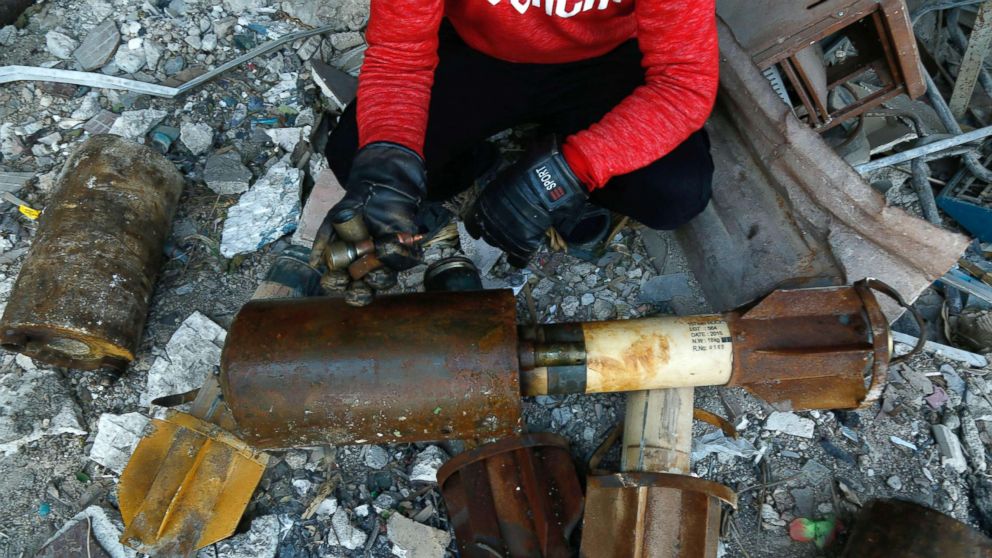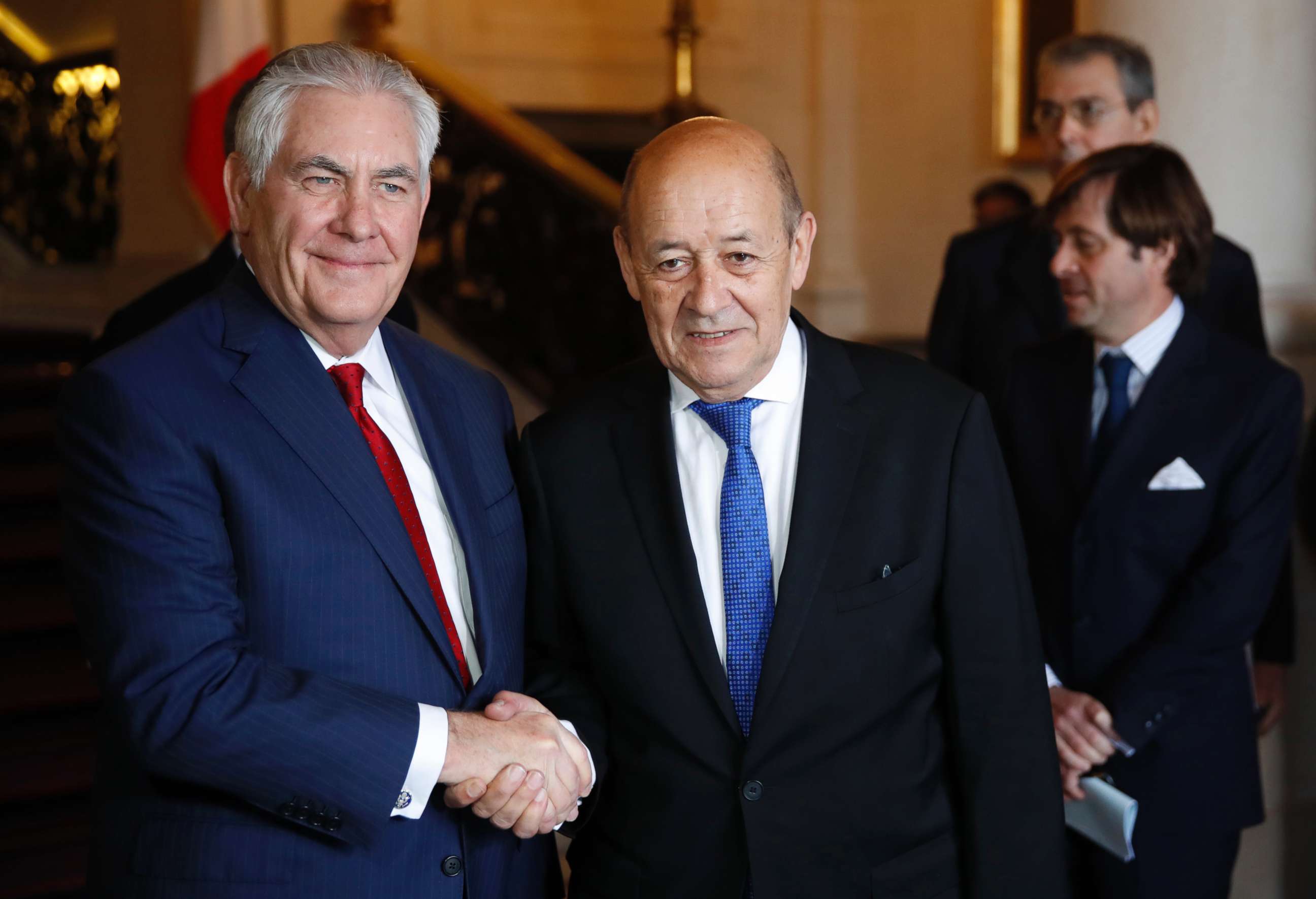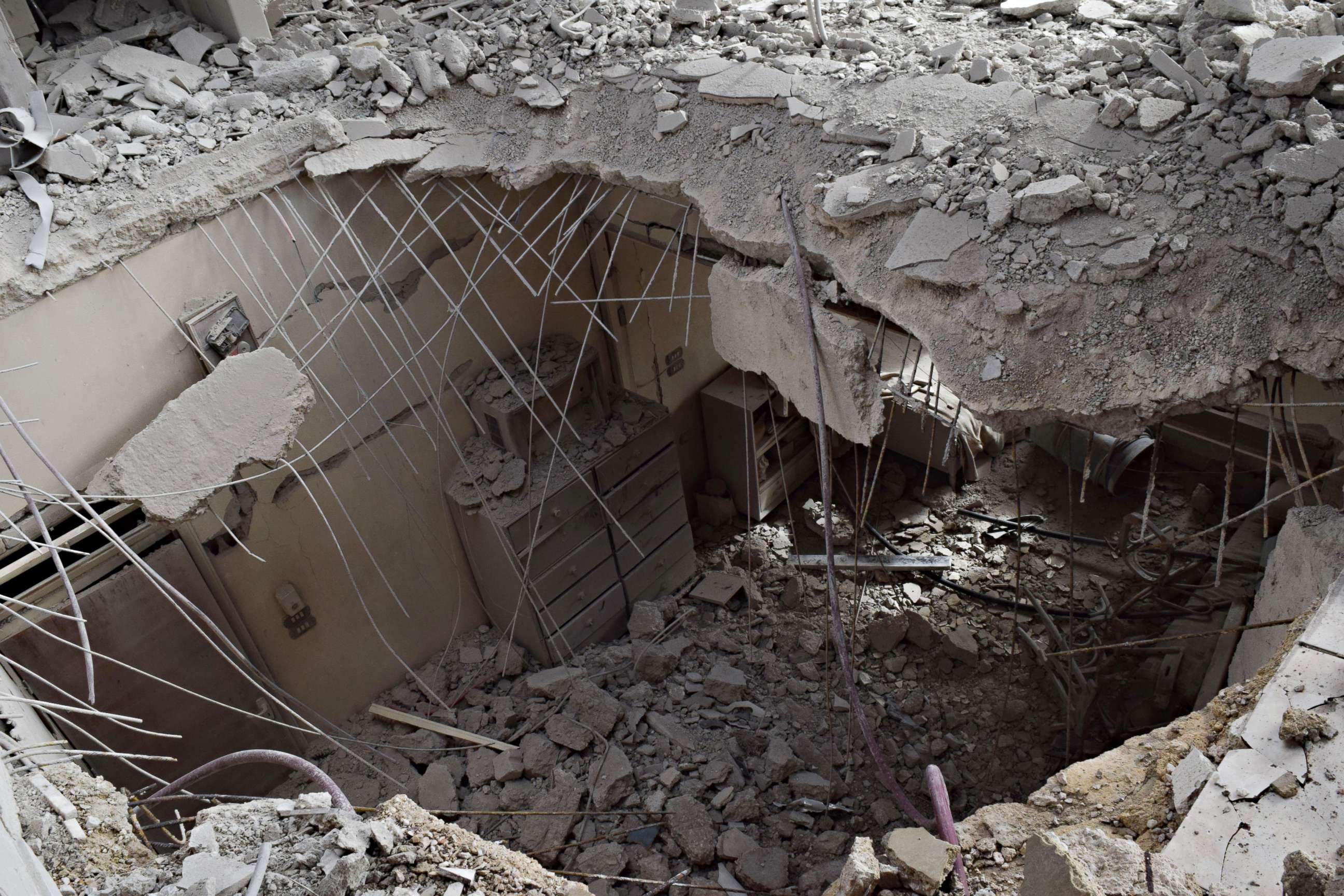Tillerson: Russia 'ultimately bears responsibility' for chemical attacks in Syria
The strong statement comes as the U.S. tries to rally the global community.
— -- In the aftermath of another "apparent chlorine gas attack" by the regime of Syrian President Bashar al-Assad, Secretary of State Rex Tillerson blasted the Assad regime for its "crimes against humanity" but also laid some of the blame on Russia.
"Whoever conducted the attacks, Russia ultimately bears responsibility for the victims in east Ghouta and countless other Syrians targeted with chemical weapons since Russia became involved in Syria," Tillerson said in Paris at the launch of a new international group to pressure Assad and Russia.
The strong statement comes as the U.S. tries to rally the international community and assert a leadership role in Syria after seven years of war and in the face of an increasingly strong Assad regime.
As ABC News reported Monday, Tillerson highlighted the latest reported chemical weapons attack that affected more than 20 civilians -- most of them children, he said. The attack hit east Ghouta, an enclave of rebel support in the Damascus suburbs, a part of the country that Assad has long dominated. East Ghouta has been under siege by the regime for years now, but despite a cease-fire agreement over the summer, the regime has starved and bombed the area for the past few months. In recent weeks, that bombing campaign escalated, according to monitoring groups.

"The recent attacks in east Ghouta are a serious concern that Bashar al-Assad's Syrian regime may be continuing its use of chemical weapons against its own people," Tillerson said. "Since April 2014, there has been mounting evidence that Syria continues to illicit possess chemical weapons and use them against its own people."
But it was Russia that Tillerson took to task, challenging the role the country plays by providing support and troops to Assad -- who, after initial defeats, now controls half of the country's population and territory.
"Russia's failure to resolve the chemical weapons issue in Syria calls into question its relevance to the resolution to the overall crisis," Tillerson said.
In particular, Tillerson said Russia had failed to live up to its commitments under the 2013 deal with the Obama administration to eliminate all of Syria's chemical weapons and other international legal obligations: "There is simply no denying that Russia, by shielding its Syrian ally, has breached its commitments to the United States as a framework guarantor. It has betrayed the Chemical Weapons Convention and U.N. Security Council Resolution 2218," he said.

Russia has intervened in Syria on Assad's behalf since 2015, but in August 2013 it helped broker an agreement with President Barack Obama to remove Syria's chemical weapons stockpile. That agreement came on the heels of Obama contemplating airstrikes on Syrian targets after the regime killed at least 1,400 people, including 426 children, in a chemical weapons attack, also in the Damascus suburbs, according to a U.S. government report at the time. Ultimately, Obama punted to Congress, and the U.S. never took any action.
The Trump administration challenged Syria's use of chemical weapons once before -- with a series of airstrikes last April on a Syrian air base after the regime killed dozens in a town called Khan Shaykhun.
U.S. ambassador to the United Nations Nikki Haley joined Tillerson in his condemnation of Russia, releasing a paper statement that said, "This attack in Syria should weigh heavily" on Russia's "conscience."
The U.S. "will pursue all available avenues for accountability," according to Haley's office, including through the U.N. Security Council, the Organization for the Prohibition of Chemical Weapons and the International Partnership Against Impunity for the Use of Chemical Weapons -- the new international group Tillerson helped launch today. The 29-nation organization will collect, share and publicize information about chemical attack perpetrators, including details about sanctions.

For his part, Tillerson called on Russia to "at a bare minimum ... stop vetoing and at least abstain from future Security Council votes on this issue."
Russia has twice vetoed resolutions for an investigative body to examine who is responsible for chemical weapons attacks in Syria, and the Security Council was set to meet again on Syria on Tuesday afternoon.
"This initiative puts those who ordered and carried out chemical weapons attacks on notice. You will face a day of reckoning for your crimes against humanity and your victims will see justice done," Tillerson said in conclusion. "The people of east Ghouta are watching, and the rest of the world is watching as well."
But in a major policy address on Syria last week, Tillerson sounded a more optimistic tone on Russia and the "meaningful role" it plays in Syria -- and even praised Russia for its cooperation with the U.S. and Jordan on one de-escalation zone south of Damascus, despite ongoing Assad offensives elsewhere.
"That's why we're disappointed with the foreign minister's comments," Under Secretary of State Steve Goldstein told ABC News Monday, a reference to Russian Foreign Minister Sergei Lavrov accusing the U.S. of fomenting unrest and instability in Syria and even supporting al Qaeda-linked militants. "The secretary is very unhappy that Russia has not stepped up to the plate as we would expect them to."
Still, with offensives against the last rebel stronghold, Idlib province, and the relentless bombing of east Ghouta, Assad and his allies, including Russia and Iran, seem to be marching onward, again and again deploying brutal tactics.
"No party in the Syrian conflict is capable of victory or stabilizing the country via military means alone," Tillerson warned, despite the regime's offensives.




